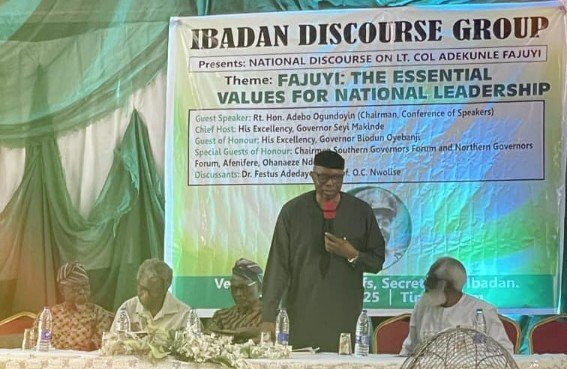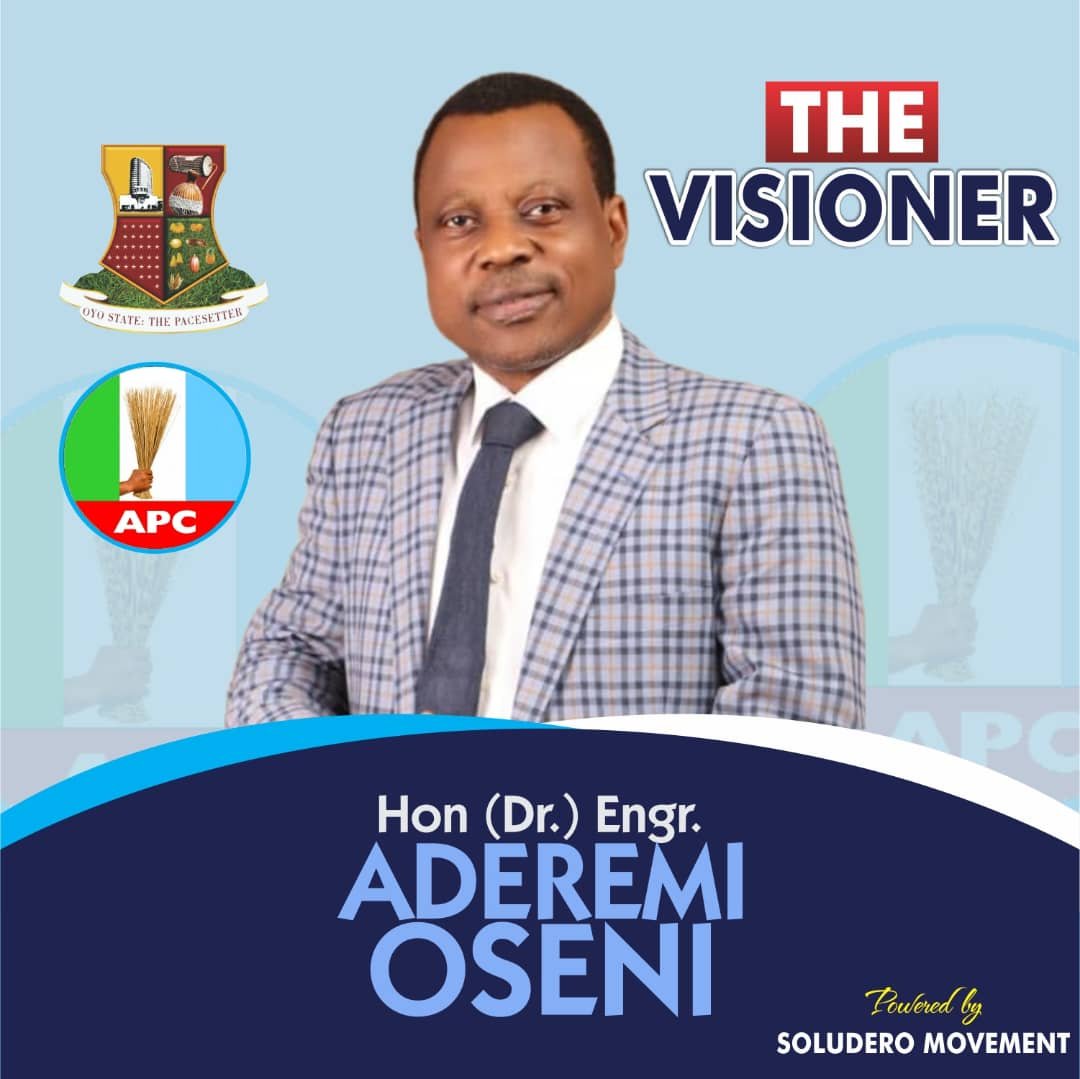The dateline was Thursday, 10 July, 2025. The event was a national discourse on leadership organised by the Ibadan Discourse Group (IDG) in honour of late Colonel Adekunle Fajuyi, the first governor of the old Western Region who was killed, alongside then Head of State, Major General Thomas Aguiyi-Ironsi, in the 29 July, 1966 military counter-coup.
It was a gathering of prominent Nigerians where former governor of Ondo State, Dr Olusegun Mimiko, Dr Yemi Farounbi, Chief Adebisi Adesola, Professor Osisioma B. C. Nwolise, Mr Banji Ogundele, and several others averred that valued-based leadership is the key to taking Nigeria out of the woods.
They unanimously agreed and identified lack of purposeful, value-based leadership, over the years, as the factor militating against the realisation of the full potentials of the country.
The national discourse, held at the House of Chiefs, Secretariat, Ibadan, with the theme “Fajuyi: Essential Values for National Leadership,” celebrated the life and legacy of Fajuyi as a model of value-based and sacrificial leadership.
In his opening speech, chairman of the Ibadan Discourse Group, Chief Adebisi Adesola, described the event and topic as apt, considering the state of the nation and the unending debate on purposeful leadership.
He disclosed that the Group is an independent think-tank, designed to engineer intellectual dialogue and provide practicable solutions to humanity problems thereby fostering national growth.
Adesola, a former General Manager of the Broadcasting Corporation of Oyo State (BCOS), and a former Secretary to the State Governments (SSG), said the Group aimed to achieve in partnership with organisations, institutions and individuals who share the IDG ideals.
He described the late Colonel Fajuyi as a worthy national hero to be referenced as a case study in the quest for Nigeria’s unity anchored on good leadership.
He said Fajuyi was a rare cardinal whose leadership carried the value, sacrifice, hospitality and prevented two regions of this country from being at dagger drawn.
Chief Adesola emphasised the need to reflect on Fajuyi’s leadership qualities— sacrifice, hospitality, and courage— as a foundation for restoring value-based leadership in Nigeria. He said: “Today, our focus is on leadership. We are using Lt. Col Adekunle Fajuyi as a case study in sacrificial leadership.
“Let us all look at our political leadership recruitment system and process and see how we can improve on what we have so that Nigeria can reach an optimal level.
“Nigerians have, over the years, identified leadership as a major problem that has handicapped the full realisation of the potential of our country.
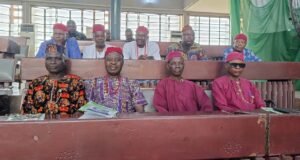
“In the 28 years of military rule, every change in leadership has been attributed to poor performance. Unfortunately, this trend has not changed the civilian administration. Since 1999, this has been a trend. We have seen President Umar Yar’ Adua criticising the power programme of his predecessor and even stopping the programme.
“Yar’ Adua criticised even the elections that brought him in, organised by the predecessor. Yet, both he and Olusegun Obasanjo were from the same party, the Peoples Democratic Party (PDP).
“We are seeing the same trend playing out between Presidents Muhammadu Buhari and Bola Tinubu, both of APC.
“If leadership from the same political party shares the feelings that the proceeding leadership is inadequate, it suggests that leadership is still a problem in Nigeria. And we have seen President Obasanjo, at various times, criticising his successors from his party and opposition party.”
Adesola said it was in the light of the foregoing that IDG decided to hold a discussion on Fajuyi as a way of directing attention to the pertinent issue of leadership. “Perhaps we, as Nigerians, can agree on minimum prerequisites for leadership positions, minimum expectations from leadership positions, and minimum performance levels,” he added.
Speaking, Dr Mimiko said he was at the event to listen and to learn. He added: “I didn’t imagine that I would need to make any intervention, unless I volunteer after listening to the lecture and the discussion.
“But since it is a discourse about leadership, I was interested because, whether we like it or not, leadership has been one of the banes of our development. And o felt I want to benefit from the perspectives here today.
“Let me congratulate you sir [Dr Farounbi] for focusing on what is important in this era. It is interesting and encouraging to have a group that has enough sense of history and presence of mind to celebrate what Colonel Adekunle Fajuyi represented.
“We have a decent audience as, nowadays, people rarely get excited about matters like this. Many people didn’t live in the era that we hope to re-enact by focusing on leadership, using Colonel Adekunle Fajuyi as an example.
“But let me just say that whatever anybody says today, Adekunle Fajuyi represented, in terms of the action he took on that fateful night, the very best quality that any nation can espouse.
“Yoruba are not known for cowardice, but they are also very diplomatic; they can approbate and reprobate occasionally. I think it is part of the diplomatic culture of the Yoruba because they will tell you, mo’ja mo’sa la mọn akikanju logun (it makes sense for you to run away when you see death approaching. But the same Yoruba will tell you, iku ogun lo npa akikanju. Iku odo lo npa omuwe (a real soldier, so properly called, should never run away from battle; that actually the soldier should die in the vortex of battle). The latter was what Adekunle Fajuyi represented.
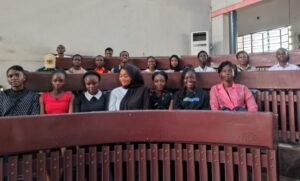
“But beyond that, Colonel Adekunle Fajuyi also demonstrated that what has turned out to be a deep ethnic division in Nigeria could be superficial after all because the ultimate sacrifice you can make is to give your life for what you believed in. In this case, if Fajuyi had seen things within the lens of an Igbo ethnic enemy, he will never have sacrificed his life.
“Perhaps, the military ethos then were different from what we have now. But nobody can take away from the fact that what eventually came to be this ethnic division in Nigeria collapsed to be superficial as Colonel Fajuyi demonstrated that his boss, his friend deserved to be protected, even with his own life. And that was the ultimate unity you can create in a nation.”
Speaking with newsmen at the end of the event, Mimiko commended members of the Ibadan Discourse Group for inviting students from the University of Ibadan, Victor Omololu Olunloyo Polytechnic, Ibadan and Ibadan City Polytechnic to the event.
He said it has become imperative to bring to the consciousness of the younger generation the sacrifices and virtues of the Late Colonel Fajuyi. “Fajuyi’s type of discipline, courage and selflessness are values any nation needs for progress.
“It is gratifying that the Ibadan Discourse Group put this event together, particularly, the intervention and participation of the students that will extol the virtues of Fajuyi. For every outing, our focus should be on the future. If we continue along this path, celebrating the best of what has been, for us to be able to engineer the future, I think it is a worthwhile.”
Patron of the Group, Ambassador (Dr) Yemi Farounbi, extolled the virtues of late Colonel Adekunle Fajuyi, describing him as a good ambassador and a brave soldier with exemplary loyalty to leadership.
“Late Fajuyi was on a frontline military mission in Congo where he performed excellently and was decorated with the Military Cross, the highest British medal for courage.
“The similar courage he showcased when he stood by his Head of State and Supreme Commander, Major-General Thomas Aguiyi-Ironsi, by laying down his life.
“Aside his military bravery, Fajuyi administrative prowess included his stoppage/quelling of the operation Wild Wild West political crisis (Operation Wet E) of the then Western Region between loyalist and supporters of Chief Obafemi Awolowo and Chief Samuel Ladoke Akintola (premiers of the region),” he said.
On his part, the guest lecturer, Professor O.B.C Nwolise, a retired teacher from the University of Ibadan, said good leadership is rooted in peace, development, and the wellbeing of the people. He stressed that lawlessness, not lack of leadership, is Nigeria’s greatest challenge.
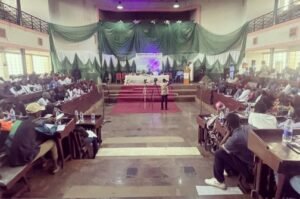
According to Nwolise, when laws are broken, bad leadership follows. He described the annulled June 12 election as the only free and fair election in Nigeria’s history and declared that Nigeria is not a true nation, but merely a state.
Professor Nwolise, who retired from the University of Ibadan in 2020 after 38 years and on attainment of 70 years, the mandatory years of teaching service, proposed some solutions to the myriads of problems constituting impediments to national development. The solutions, he said, included immediate convening of the Southern Governors’ Forum and Southern Governors Wives’ forum;
Reversal/dousing of any tension deliberately raised between Igbo and Yoruba as “these tensions are traps to further divide us at our own peril”; formation of a team to explore the philosophical songs of the East and West as a means of teaching sacrifice, and the establishment of the Adekunle Fajuyi/Aguiyi-Ironsi Tripartite Life-Saving Memorial Hospital, incorporating orthodox medicine, African traditional healing, and spiritual care.
John Njoku, a public affairs analyst, declared that the most important thing in human life is learning from history, adding, “at least, I have learnt one or two things today.”
Going down the memory lane, Njoku said Major General Aguiyi-Ironsi has asked Colonel Fajuyi, ‘am I safe?’ before embarking on that journey that led to the death of the two military leaders.
“He feared that danger lies ahead because he was cautioned by the then OmoN’Oba of Benin, the traditional ruler of Benin Kingdom, not to travel to the Western Region in his own interest. But General Ironsi ignored the advice because if the love he had for the country. He came here [Ibadan] just to inform the governor and the people of the Western Region about Decree 8, otherwise known as the “Unification Decree”.
Njoku spoke glowingly about the cordial relationship that existed between the Yoruba and Igbo people, and, quoting the renowned Professor of History, Jide Osuntokun, he described the Nigerian Democracy as “a mere pretense, gradually being wheeled into the mortuary, instead of being healed.”
Toluwalope Ifedayo, a Part Four student of Political Science from the University of Ibadan, spoke on the essence of leadership and collective responsibility by both the leaders and the citizens.
“I will advocate what I call volunteerism because we all owe Nigeria a responsibility towards its betterment. As well as our leaders, the citizens are also leaders in their own capacities. Expectedly, they should perform their roles to the country with or without any rewards,” he said.
Other speakers at the event, including Representatives of the Ohanaeze Ndigbo, members of pressure groups, called for unity, peace, and national development, urging Nigerians to emulate the spirit of discipline, fearlessness, and integrity that defined the leadership of the late Colonel Adekunle Fajuyi.















